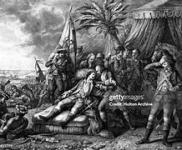In Dickens' telling in A Tale of Two Cities, the revolution is a thing planned years in advance by a secret society — not Freemasons or Illuminati, just a group of peasants and shopkeepers who meet in secret and call each other "Jacques." ("Jacques Bonhomme" — "Jack Goodman" — had for centuries been a generic name for a French peasant, which was why the peasant revolt of the 14th Century was called the "Jacquerie.")
This is an important plot point, because after the revolution starts this organization has a lot of clout, indeed seems at times to be the actual government, and the Defarges are leading figures in it. This leads Darnay to be tried and condemned, for crimes of the St. Evremondes that only the Defarges remember.
In actual history, no such thing existed. The revolution was started by educated bourgeoisie who were elected representatives in the Third Estate. The lower classes did not get involved until "things in general" grew chaotic enough for them to loot their lords' chateaux, or commit acts of mob violence like the September Massacres, and get away with it.
Apart from the storming of the Bastille, Dickens never even mentions any of the really important events of the revolution, such as the Oath of the Tennis Court or the king's flight to Varennes.
This is an important plot point, because after the revolution starts this organization has a lot of clout, indeed seems at times to be the actual government, and the Defarges are leading figures in it. This leads Darnay to be tried and condemned, for crimes of the St. Evremondes that only the Defarges remember.
In actual history, no such thing existed. The revolution was started by educated bourgeoisie who were elected representatives in the Third Estate. The lower classes did not get involved until "things in general" grew chaotic enough for them to loot their lords' chateaux, or commit acts of mob violence like the September Massacres, and get away with it.
Apart from the storming of the Bastille, Dickens never even mentions any of the really important events of the revolution, such as the Oath of the Tennis Court or the king's flight to Varennes.
